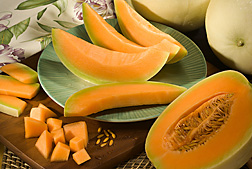|
Read the
magazine
story to find out more. |
|

Orange-fleshed honeydew melons
may be a better choice for organic growers than cantaloupe because of the
honeydew's absence of netting, which is known to harbor bacteria that can cause
human illness. Click the image for more information about
it.
|
|

|
Orange-Fleshed Honeydews Evaluated
By Alfredo
Flores November 29, 2007
A team of Agricultural Research Service (ARS) scientists has evaluated the merits of
melons that combine the best attributes of cantaloupes and honeydew melons.
The team has been searching for new ways to solve organic and
conventional melon growers' number one concern: food safety, according to plant
physiologist
Gene
Lester, in the
ARS
Crop Quality and Fruit Insects Research Unit in Weslaco, Texas.
Cantaloupes, also known as muskmelons, have sometimes tested positive
for Salmonella lignieres and Escherichia coli O157:H7. That's
because potentially harmful microbes can readily lodge in the fruit's rough,
netted skin and defy sanitation measures.
When netted melons are cut, any harmful microbes—hiding in
crevices on the exterior surface and covered by naturally-forming biofilms that
protect them from sanitizers—can be transferred to the inner flesh.
The team compared "netted" cantaloupes—the type bearing
orange-fleshed fruit with deep-green rind and netlike outer markings—with
a phytonutrient-dense, but nonnetted, melon genotype. They found that the
smooth-skinned melons are less likely to harbor bacteria.
The smooth-skinned, orange-fleshed melons are also being evaluated for
their flavor. One such melon, Orange Dew, is being grown organically in limited
quantities in the United States. It has beaten the netted Cruiser cantaloupe in
a taste test. That's because Orange Dew has a Brix score—a measurement of
sweetness—of 11 to 14, compared to 9 for most cantaloupes. Sweetness has
been shown to be the most important taste factor in repeat purchase of melons.
The orange-fleshed honeydews store well, too—for around three
weeks, compared to 10 to 14 days for a typical netted cantaloupe kept in
simulated commercial retail storage conditions.
Read
more about the research in the November/December 2007 issue of
Agricultural Research magazine.
ARS is the U.S. Department of
Agriculture’s chief scientific research agency.